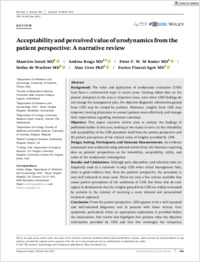Acceptability and perceived value of urodynamics from the patient perspective : a narrative review
- Serati, Maurizio ORCID Department of Obstetrics and Gynecology, University of Insubria, Varese, Italy
- Braga, Andrea ORCID Faculty of Biomedical Sciences, Università della Svizzera italiana, Switzerland ; Department of Obstetrics and Gynaecology, EOC ‐ Beata Vergine Hospital, Mendrisio, Switzerland
- Rosier, Peter F. W. M ORCID Department of Urology, University Medical Center Utrecht, Utrecht, The Netherlands
- de Wachter, Stefan ORCID Department of Urology, Faculty of Medicine and Health Sciences, University of Antwerp, Edegem, Belgium
- Uren, Alan ORCID Bristol Urological Institute, Southmead Hospital, Bristol, UK
- Finazzi‐Agrò, Enrico ORCID Urology Unit, Department of Surgical Sciences, Tor Vergata University Hospital, University of Rome Tor Vergata, Rome, Italy
- 2022
Published in:
- Neurourology and urodynamics. - 2022, vol. 41, p. 1065-1073
Acceptability
Lower urinary tract dysfunction
LUTS
Patient perception
Patient perspective
Tolerability
Urodynamic
English
Background: The value and application of urodynamic evaluation (UDS)have been a controversial topic in recent years. Gaining robust data on the patient viewpoint in this area is important since, even when UDS findings do not change the management plan, the objective diagnostic information gained from UDS may be valued by patients. Moreover, insights from UDS may empower treating physicians to counsel patients more effectively and manage their expectations regarding treatment outcomes. Objective: This expert narrative review aims to analyze the findings of published studies in this area, looking at two topics in turn: (a) the tolerability and acceptability of the UDS procedure itself from the patient perspective and(b) patient perceptions of the clinical value of insights provided by UDS. Design, Setting, Participants, and Outcome Measurements: An evidence assessment was conducted using selected articles from the literature reporting data on patients' perspectives on the tolerability, acceptability, utility, and value of the urodynamic investigation. Results and Limitations: Although pain, discomfort, and infection risks are frequently used as a rationale to skip UDS when initial management fails, there is good evidence that, from the patients' perspective, the procedure is very well tolerated in most cases. There are only a few articles available that assess patient perceptions of the usefulness of UDS, but those that do exist appear to demonstrate that the insights gained from UDS are widely welcomed by patients in the interest of receiving a more tailored and personalized treatment approach. Conclusion: From the patient perspective, UDS appears to be a well‐accepted and well‐tolerated diagnostic tool in patients with lower urinary tract symptoms, particularly when an appropriate explanation is provided before the examination. Our review also highlights that patients value the objective information provided by UDS and that this outweighs the temporary invasiveness of the test. This information is particularly relevant in light of the relative lack of evidence in the literature about patient expectations of specialist care in functional urology, which may have hindered progress with quality of care.
- Collections
- Language
-
- English
- Classification
- Medicine
- License
- Open access status
- hybrid
- Identifiers
-
- DOI 10.1002/nau.24932
- ARK ark:/12658/srd1324949
- Persistent URL
- https://n2t.net/ark:/12658/srd1324949
Statistics
Document views: 97
File downloads:
- Braga_2022_Wiley_neururo: 182
